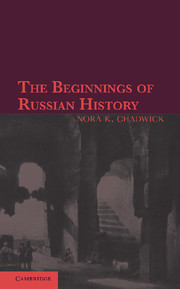Book contents
- Frontmatter
- Dedication
- Epigraph
- Contents
- Preface
- Chapter I The Early Records
- Chapter II The Early History of Kiev
- Chapter III Greek and Oriental Evidence
- Chapter IV Vladimir I
- Chapter V The Treaties with the Greeks, and Russian Heathenism
- Chapter VI Yaroslav the Wise
- Chapter VII Voevoda and Kormilets
- Chapter VIII Vladimir Monomakh
- Appendix I Extract from Ibn Miskawaih, in The Eclipse of the 'Abbasid Caliphate, Vol. v. Translated from the Arabic by D. S. Margoliouth
- Appendix II The Scandinavian Background: Oddr Víth-förli (Örvar-Oddr)
- Index
Chapter III - Greek and Oriental Evidence
Published online by Cambridge University Press: 05 June 2016
- Frontmatter
- Dedication
- Epigraph
- Contents
- Preface
- Chapter I The Early Records
- Chapter II The Early History of Kiev
- Chapter III Greek and Oriental Evidence
- Chapter IV Vladimir I
- Chapter V The Treaties with the Greeks, and Russian Heathenism
- Chapter VI Yaroslav the Wise
- Chapter VII Voevoda and Kormilets
- Chapter VIII Vladimir Monomakh
- Appendix I Extract from Ibn Miskawaih, in The Eclipse of the 'Abbasid Caliphate, Vol. v. Translated from the Arabic by D. S. Margoliouth
- Appendix II The Scandinavian Background: Oddr Víth-förli (Örvar-Oddr)
- Index
Summary
We must now turn to outside records to see how far it is possible to obtain further light on the events recorded in the Russian chronicle. Apart from the Norse sagas, the chief sources of information are the records of the contemporary Greek writers living in Byzantium. These Greek records are very valuable, being often full and detailed, and at times drawn from people who were the eyewitnesses of the events which they describe. Arabic accounts are almost equally valuable, being also derived in part from eyewitnesses, and being at times even fuller than the Greek. Some of these were also written in Byzantium itself. These Arabic accounts have a special importance, partly as being first-hand accounts of the Norsemen at their most easterly limit, and partly because, unlike the accounts of the western Vikings, which are derived mainly from the Icelandic sagas, and as such have passed through a literary medium intended for purposes of entertainment, these eastern accounts are much closer to our modern ideas of historical writing. They have, in addition, the advantage over the western records of having been committed to writing either absolutely contemporaneously with the events recorded, or comparatively shortly afterwards.
Finally, we have a small but extremely interesting document relating to the Khazars which is also relevant to our study. This document is one of a small group of documents composed in the Hebrew language, and purporting to relate to the Khazars of the tenth century. They have been recently re-edited and published with photographic facsimile and exhaustive notes by the Russian scholar Kokovtsov, and consist of a letter purporting to be by a Spanish Jew named Hasdai Ibn Shafrut or Shapperut to the Khazar king Joseph, and relating to a period some time before 960; King Joseph's answer, of which two versions are extant; and the document in which we are especially interested, and which appears to be a fragment of a letter or narrative from an unknown Khazar Jew. This fragment, which was discovered by Schechter, and first published by him in 1912, is at present in the Cambridge University Library (T. S. Loan, 38), and is commonly referred to in discussions relating to these Khazar documents as the ‘Cambridge Document’.
- Type
- Chapter
- Information
- The Beginnings of Russian HistoryAn Enquiry into Sources, pp. 40 - 64Publisher: Cambridge University PressPrint publication year: 2013



